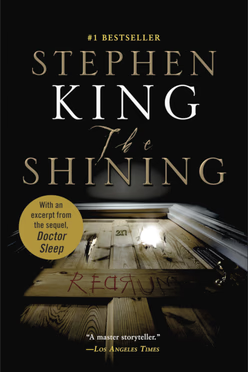The Shining

Alcoholic writer Jack Torrance uproots his wife Wendy and five-year-old son Danny from New England to Colorado, where they’ll serve as winter caretakers for the Overlook Hotel. The hotel, a premier destination with a shady past, houses a malevolent presence bent on claiming Danny for its own ends.
King uses the hotel’s supernatural presence and Danny’s burgeoning telepathy to explore addiction from the perspectives of the addicted and afflicted. Knowing about King’s battles with alcoholism and addiction, it’s hard not to read this as the painful confession of an alcoholic parent.
Of course, it’s also an effective haunted house story. King packs the hotel with memorable terrors like hedge animals that move whenever you take your eyes off them. These predate Doctor Who’s infamous Weeping Angels, but prove just as unsettling. Indoors, the rooms play host to assorted ghosts, such as room 217’s bloated corpse, floating in a tub, ready to rise and strangle any unlucky visitors.
But Jack proves the true monster. Prior readings rendered him a good man undone by the hotel’s evil influence, but this listen changed my mind. Jack displays selfish and myopic behavior from the start. His alcoholism intensifies—but doesn’t cause—his self-destructive actions. He loves his wife and son, but he’s the star of his own movie. One that had him trending downward prior to the hotel, despite giving up drinking. The hotel exploited him, but one suspects it only accelerated the inevitable.
Being alone with your thoughts for hours on end writing may necessitate an inward focus. Writing this novel, King could see a successful career within his grasp, but he wasn’t far removed from living in a trailer, banging out short stories in the cramped laundry room. The pressure must have been enormous.
This listen also revealed other connections to King’s personal life. Like when Wendy remembers Jack inviting other students over for drinks and discussions during their early courtship in college.
She felt no real urge to take part; it was enough to sit in her rocking chair beside Jack, who sat cross-legged on the floor, one hand holding a beer, the other gently cupping her calf or braceleting her ankle.
Now consider this remembrance from King in On Writing, about how he met his wife, Tabitha, at a college poetry workshop1:
Tabby was in one of Jim Bishop’s rocking chairs that night. I was sitting on the floor beside her. I put my hand on her calf as she spoke, cupping the curve of warm flesh through her stocking. She smiled at me. I smiled back.
Again, hard not to read this as King’s most personal work to date.
After this listen, I tracked down a copy of the excised prologue, Before the Play, online. Much of it proffers the Overlook’s origin story—an interesting read, but one better shrouded in mystery and doled out via the scrapbook Jack encounters in the published novel. Including it in the prologue positions the novel as the Overlook’s story, but it‘s not.
It‘s Jack‘s story, and the prologue’s last segment plays out through young Jack‘s eyes. He‘s about the same age as Danny in the book and the segment opens with him sitting outside, waiting for his daddy to come home. But when Jack‘s father arrives, Jack realizes he‘s drunk. Drunk means dangerous. Jack retreats, but it‘s too late. His father perceives a slight and lashes out. Jack flees to his treehouse. Jack‘s father pursues with near murderous intent, roaring that little Jack, “Come back here and take your medicine! Take it like a man!”
Cutting this scene was a mistake. It reframes the entire story as a cyclical trap Jack had little hope of escaping. This lends his character a tragic bent, and heightens his climactic redemption, when—for a moment—he breaks the cycle.
Footnotes
-
King, On Writing, 65. ↩︎
Reading History
- 2022Oct29SatAudible (Read by Campbell Scott)
Listened to over 14 Days
- 16 Oct 20223%
- 17 Oct 202215%
- 18 Oct 202226%
- 19 Oct 202236%
- 20 Oct 202240%
- 21 Oct 202253%
- 22 Oct 202275%
- 28 Oct 202287%
- 29 Oct 2022Finished
I enjoyed Campbell Scott’s narration. His performance of Dick Hallorann, the aging black cook who warns Danny about the hotel, rang true—as improbable as that may seem. And his deadpan intonation as Grady, the bartender apparition that welcomes Jack to the hotel’s evil embrace, chilled. So did Scott’s take on Jack’s seething rage in the finale. My lone complaint lies with him pitching up his voice for Danny, an affectation that—during the finale in particular—took me out of the story.
- 2011Nov6SunPaperback (New American Library)
Read over 3 Days
- 4 Nov 201137%
- 5 Nov 201160%
- 6 Nov 2011Finished